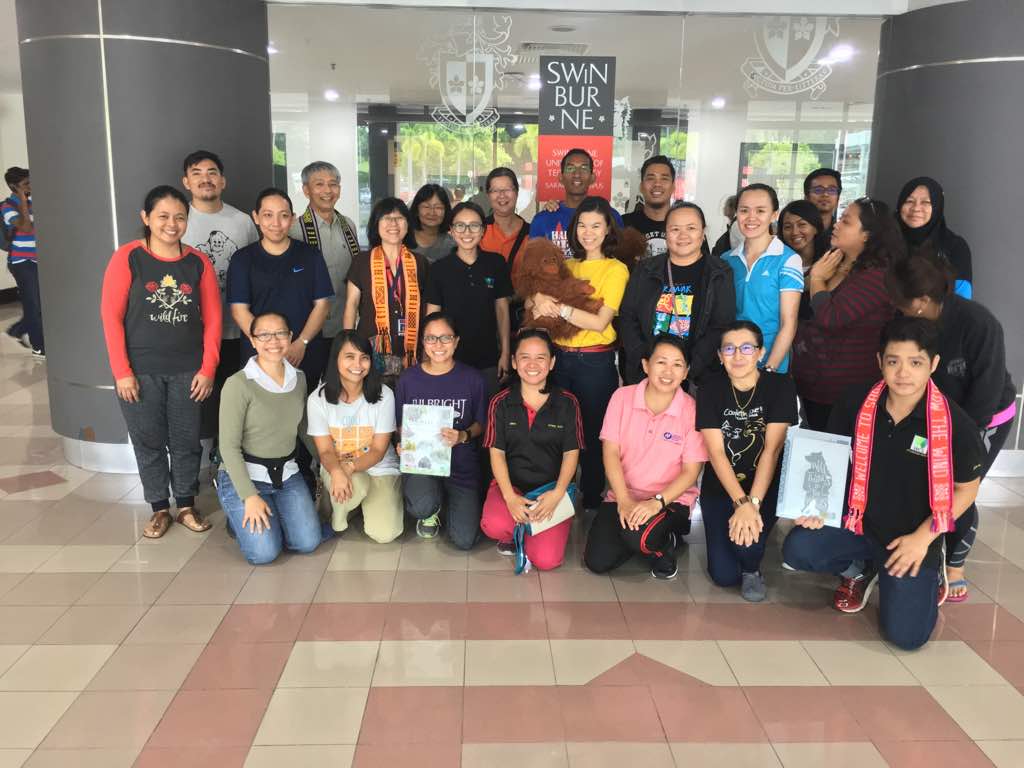KUCHING – Swinburne University of Technology Sarawak Campus and Wildlife Conservation Society (WCS) Malaysia Program recently brought together 19 individuals from different backgrounds and teaching experiences in the “Training for Teachers in English and The Next 100” 4-day workshop.
In 2015, WCS Malaysia, with the support from the Embassy of The United States of America, produced ‘The Next 100: Bridging for a new beginning’ (The Next 100), a 228-page manual containing 24 English and Conservation activities for the 100 Fulbright English Teaching Assistants stationed in schools around the country and their mentors. The manual serves as a guide for educators to use English with the environment as a platform.
During the first three days of the workshop, participants were exposed to various pedagogies of teaching and learning English. The lectures were conducted by Swinburne University lecturers, who provided insight on different learning and teaching methods, all of which can be studied in-depth by pursuing the university’s Master of Arts in TESOL (Teaching English to Speakers of Other Languages).
On day four, participants of the workshop were taken to Matang Wildlife Centre in the outskirts of Kuching to attempt the activities in The Next 100 in the outdoors. The activities were led by WCS Malaysia personnel, who were on hand to guide participants through the animal enclosures at the wildlife centre. The activities that followed the animal enclosure tour were intended to ignite the participants’ curiosity while encouraging creative thinking to solve day-to-day problems regarding the environment.
“Teachers play an essential role in the lives of the students they encounter,” stated WCS Malaysia’s Director, Dr. Melvin Gumal. “Their influence often goes beyond the scope of what we witness in the daily interactions within the classroom walls. In fact, their contributions extend beyond the scope of the classroom and school day, and in this case, they can make a positive impact on the environment by encouraging their students to rethink the little choices they make daily.”
“Incorporating wildlife or environmental themes in our lessons can spark interest and curiosity among students of all ages and this could lead to valuable lessons on conservation of wildlife and their habitats,” explained Christina Yin, co-author of The Next 100 with Dr Gumal and Sylvia Ng, and a senior lecturer and associate dean in Swinburne’s Faculty of Language and Communication. Yin demonstrated this in her session ‘Engaging Students’ when she used a plush toy orang-utan as the instrument to start a group activity generating vocabulary items leading to the creation of a short story about an orang-utan.
Fulbright English Teaching assistant (ETA), Lisa Cheung, remarked that participants were reminded that there were ways to work around the obstacles that they, as teachers, will face every day.
“The last day at Matang left me with a renewed sense of responsibility as a teacher and to focus more on conservation,” added Cheung.
Veralyn Godon from SMK Beaufort, Sabah, found the workshop to be particularly useful especially the sharing of multiple methods in delivering daily lessons. The practical methods would be very helpful for both new and experienced teachers.
Wildlife Conservation Society Malaysia Program is headquartered in Kuching, Sarawak, with offices in Kuala Lumpur, Kahang, Johor and Kuala Rompin in Peninsular Malaysia. Currently, WCS Malaysia works to preserve four priority species – orang-utans, sharks and rays, elephants and tigers. Go to https://programs.wcs.org/malaysia/ for more information on WCS Malaysia and visit its Facebook page at https://www.facebook.com/WCS.Malaysia/ for updates.
Enquiries about the MA (TESOL) program at Swinburne University of Technology, Sarawak Campus can be directed to the Course Counselling team at study@swinrburne.edu.my


